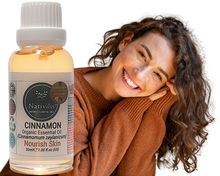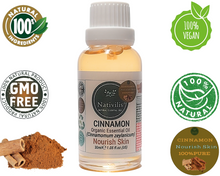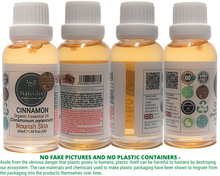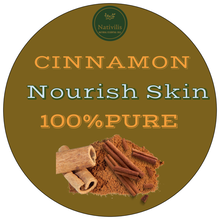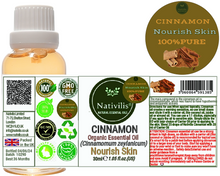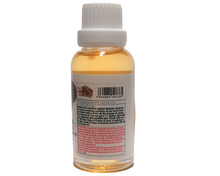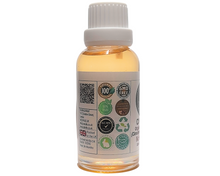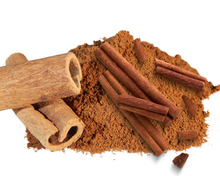
 Nativilis Cinnamon Organic Essential Oil 30 ml (Cinnamomum zeylanicum) - antibacterial antifungal antidiabetic and antioxidant - Copaiba properties
Nativilis Cinnamon Organic Essential Oil 30 ml (Cinnamomum zeylanicum) - antibacterial antifungal antidiabetic and antioxidant - Copaiba properties
The scent of cinnamon is spicy, sweet, and for many, filled with happy memories of delicious food and cozy days. Cinnamon oil is prized for its lush fragrance. It’s also linked to several health and beauty benefits.
Cinnamon in a variety of forms has been studied for its effect on infection control, blood sugar management, and other conditions. Studies indicate that cinnamon oil has:
- antibacterial
- antifungal
- antidiabetic
- and antioxidant properties
- Types of cinnamon oil - Cinnamon oil is derived from the bark or leaves of several types of trees, including the Cinnamomum verum tree and the Cinnamomum cassia tree.
Most commercially available cinnamon oil is derived from the Cinnamomum cassia tree and is called cassia cinnamon. Cinnamon that comes from the Cinnamomum verum is called Ceylon cinnamon. This variety is more expensive.
Both types are comprised of compounds and phytochemicals, such as cinnamaldehyde and eugenol. It’s these elements that make cinnamon beneficial for health.
Cinnamon oil uses and benefits
Mood enhancer
Cinnamon oil’s properties make it a popular choice for at-home aromatherapy treatments.
In aromatherapy, essential oils are diffused or spritzed into the air so they can be breathed in or absorbed into the skin. Aromatherapy has been linked to many benefits, including reduced depression and anxiety, and better sleep.
Cinnamon oil’s use in aromatherapy hasn’t been extensively studied, but many people enjoy the scent of cinnamon and find it relaxing.
Shop for essential oil diffusers.
Antibacterial properties
Research suggests that cinnamon oil:
Combats hard-to-treat bacterial organisms.
A study, which used bacterial cultures and lab tests, found that compounds in cinnamon oil had an antimicrobial effect against Pseudomonas aeruginosa, a potentially life-threatening, drug-resistant bacteria that affects plants, people, and other animals.
Supports oral health. Cinnamon’s antibacterial and antifungal properties have been found to be effective against Streptococcus mutans and on Candida ssp biofilm, two agents which cause oral infections and cavities in teeth.
Disinfects.
Cinnamon bark oil’s antibacterial properties make it a safe, effective, and non-chemical additive alternative that can be used to preserve products and increase their shelf life. One study found that cinnamon oil could be effectively used as a preservative in cosmetics, toiletries, and hospital-setting disinfectants.
Hair fullness and growth
There’s no scientific evidence linking cinnamon to hair growth in humans. There have been studies in mice that found some thickening and growth of hair.
Anecdotal reports and traditional practices indicate that a mask made of cinnamon, olive oil, and honey may be effective at promoting the growth and thickening of hair.
Food flavoring and cosmetics
Cinnamon oil is available as an essential oil and as a food-grade oil. It can also be found as an ingredient in sugar-free gum, hard candy, tea, and in commercially prepared baked goods.
Cinnamon oil is used as an ingredient in toiletries, such as toothpaste, mouthwash, soap, and body lotion. It’s also used to scent room sprays, candles, and seasonal items like pine cones and garlands.
How to use cinnamon oil
According to a survey done, many manufacturers of cinnamon essential oil recommend avoiding topical use altogether.
A general recommendation is to keep the concentration of cinnamon oil low if it’s going to come in contact with skin. For example, one guideline of .01 percent concentration or less is equivalent to 1 drop of cinnamon oil for 30 to 40 milliliters (mL) of carrier liquid.
Milliliters Equivalent ounces Equivalent tablespoons
30–40 mL 1–1.5 oz. 2 tbsp.
Add to air fresheners
To scent your home, try adding one drop of cinnamon oil to fabric sachets or dried flowers. Or you can add a couple drops to a diffuser with water. Some commercially made air fresheners have cinnamon scents made for them.
Add to body oils and moisturizers
Cinnamon oil can be mixed with a carrier oil and used for massage. Mix one drop of cinnamon oil with two to three cups of a carrier oil, such as almond oil, and use for massage or to moisturize skin.
Use cinnamon sticks
Whole cinnamon sticks contain cinnamon oil, and can be used in aromatherapy. Simply drop one or two sticks into a large pot of warm water and let the mixture simmer, allowing the steam to add fragrance to the room.
Cinnamon oil side effects and risks
Cinnamon and the liver
Cinnamon derived from the Cinnamomum cassia tree contains coumarin, a chemical which may cause liver and kidney damage and can worsen liver conditions if too much is used.
Make sure to follow package directions when using cassia cinnamon oil, and talk to your doctor before use if you have liver disease.
Cinnamon oil and diabetes medication
If you have diabetes, talk to your doctor or pharmacist before using cinnamon essential oil. Aromatherapy may interfere with other medications you’re using to control blood sugar.
Cinnamon oil is very strong, and it’s easy to use too much. Side effects and adverse reactions include skin rashes or burning.
It’s very important to dilute cinnamon oil with a carrier oil, prior to use. Try using one drop of cinnamon essential oil to two or more cups of a carrier oil, such as olive, almond, jojoba, or sesame oil.
Never rub or massage cinnamon oil directly on skin unless it’s diluted with a carrier oil.
Cinnamon oil doesn’t mix with water. Don’t pour undiluted oil directly into bathwater, as it’ll bead and can burn or irritate skin.
You also shouldn’t ingest full-strength cinnamon oil or pour it into capsules meant for oral use. Cinnamon oil can burn mucus membranes and the lining of the esophagus. Avoid rubbing full-strength cinnamon oil on the gums or getting it into your eyes too.
Some people are allergic to cinnamon. Be sure to avoid cinnamon oil or products containing cinnamon oil if you have a cinnamon allergy.
Cinnamon oil has a variety of health and beauty benefits. It can be used as an antibacterial and antifungal agent. It can also be used in aromatherapy as a relaxant. Cinnamon oil is very strong and must be used sparingly.
- Nativilis Cinnamon Organic Essential Oil 30 ml (Cinnamomum zeylanicum) - antibacterial antifungal antidiabetic and antioxidant - Copaiba properties
- Cinnamomum zeylanicum
- Extraction:Steam-distillation.
- Origin: Sri Lanka
- Aroma: warm, spicy, sweet scent brings a touch of sensuality and passion to fragrances
- Major Compounds: The main compound in the cinnamon oil is cinnamaldehyde, which was found to have hypothermic and antipyretic actions (COA - See Lab Test Nativilis Cinnamon Organic Essential Oil (Cinnamomum zeylanicum) -
-
Best Use: 24 Months
- Shipping Weight:0.08 kg
- SKU: SKU-5060864591385-30
- Type: GTIN-13 - Number: 5060864591385
- Batch Number: 10290
- Volume: 30 ml - Clear Bottle Glass with Tamper Evident Euro Drop Cap
- Dimensions Outer Packaging Recyclable Tube Cardboard Paper Kraft :102 mm (H) x 36 mm (D)
-
Safety data: External use recommended. Internal use under guidance from
a qualified practitioner. Keep away from children and eyes. Avoid if pregnant. Store in a cool dry place. - Clear Glass Bottle: We sell our Essential Oil in clear glass bottles to be able to appreciate their beautiful and therapeutic colours.
- The Outer Packaging Recyclable Tube Cardboard Paper Kraft are to protect the oil from light , because light slowly degrades the oil over time.










